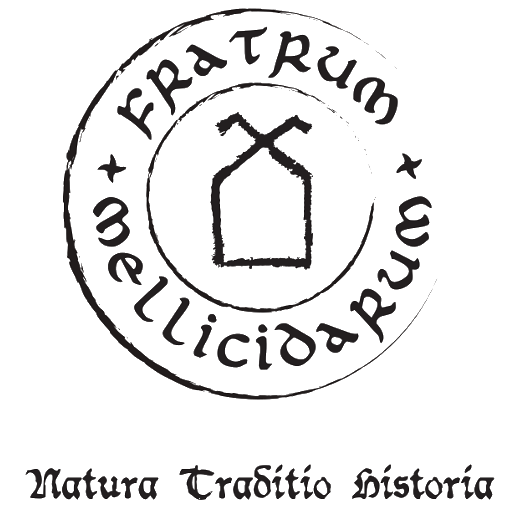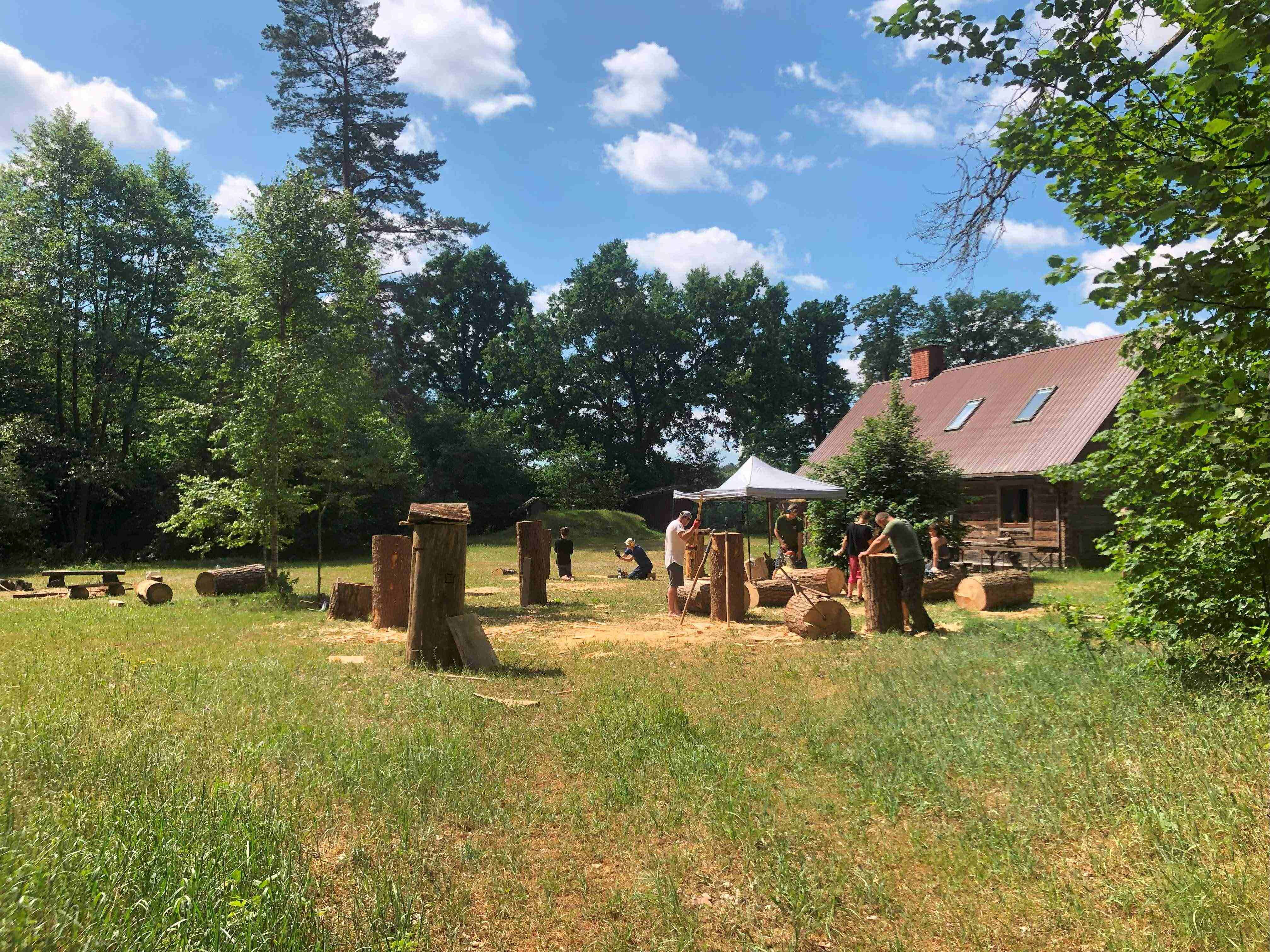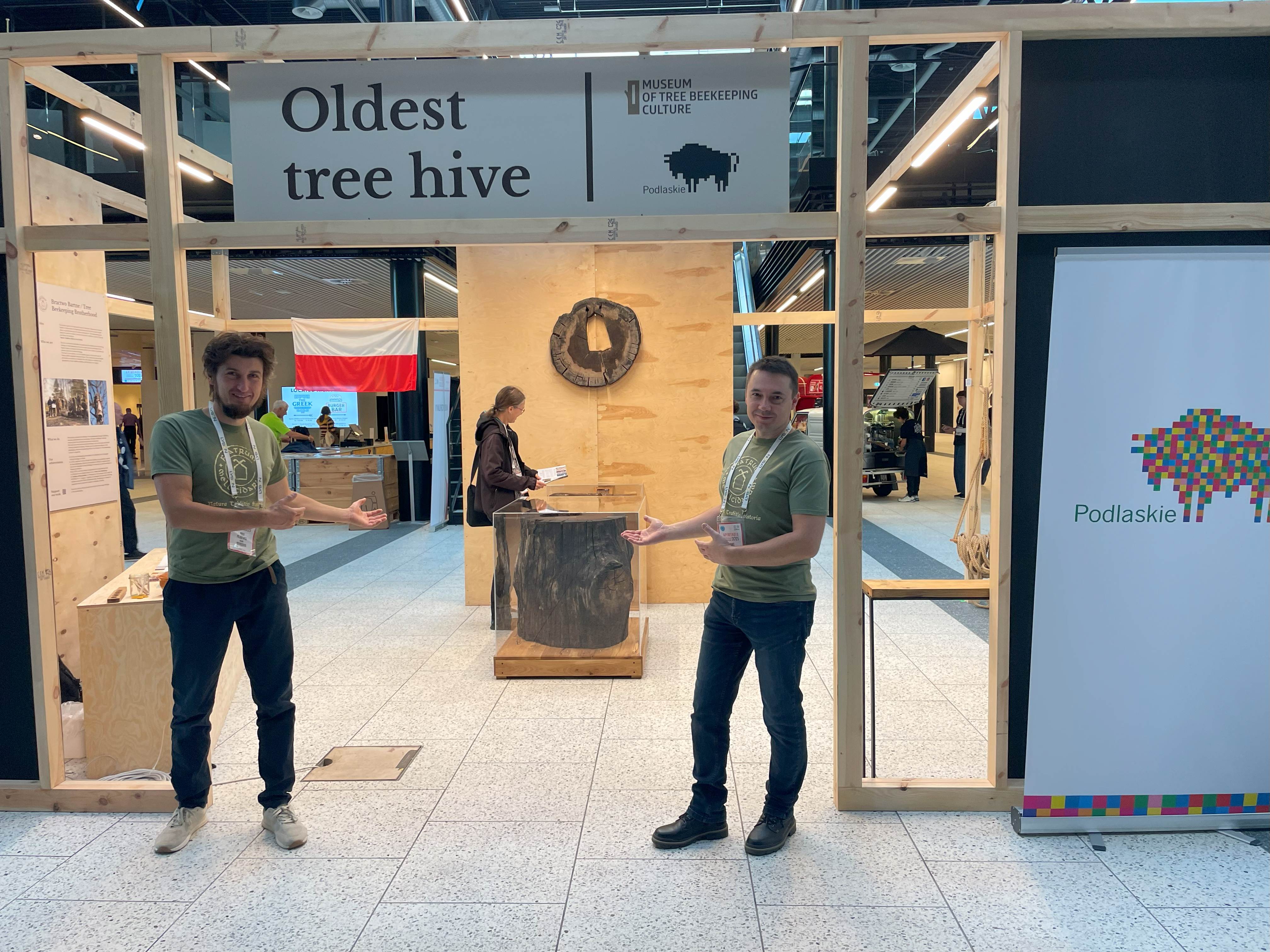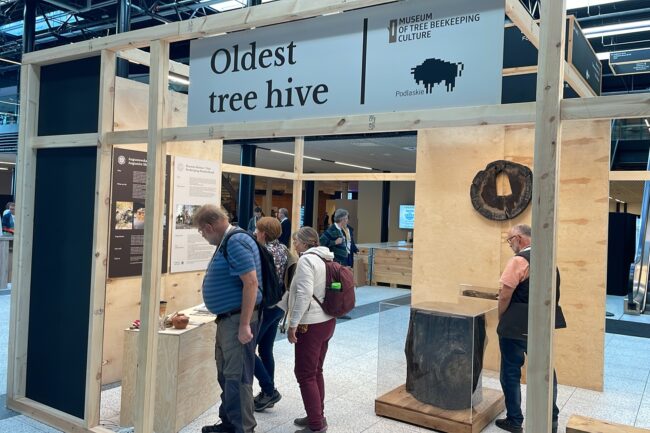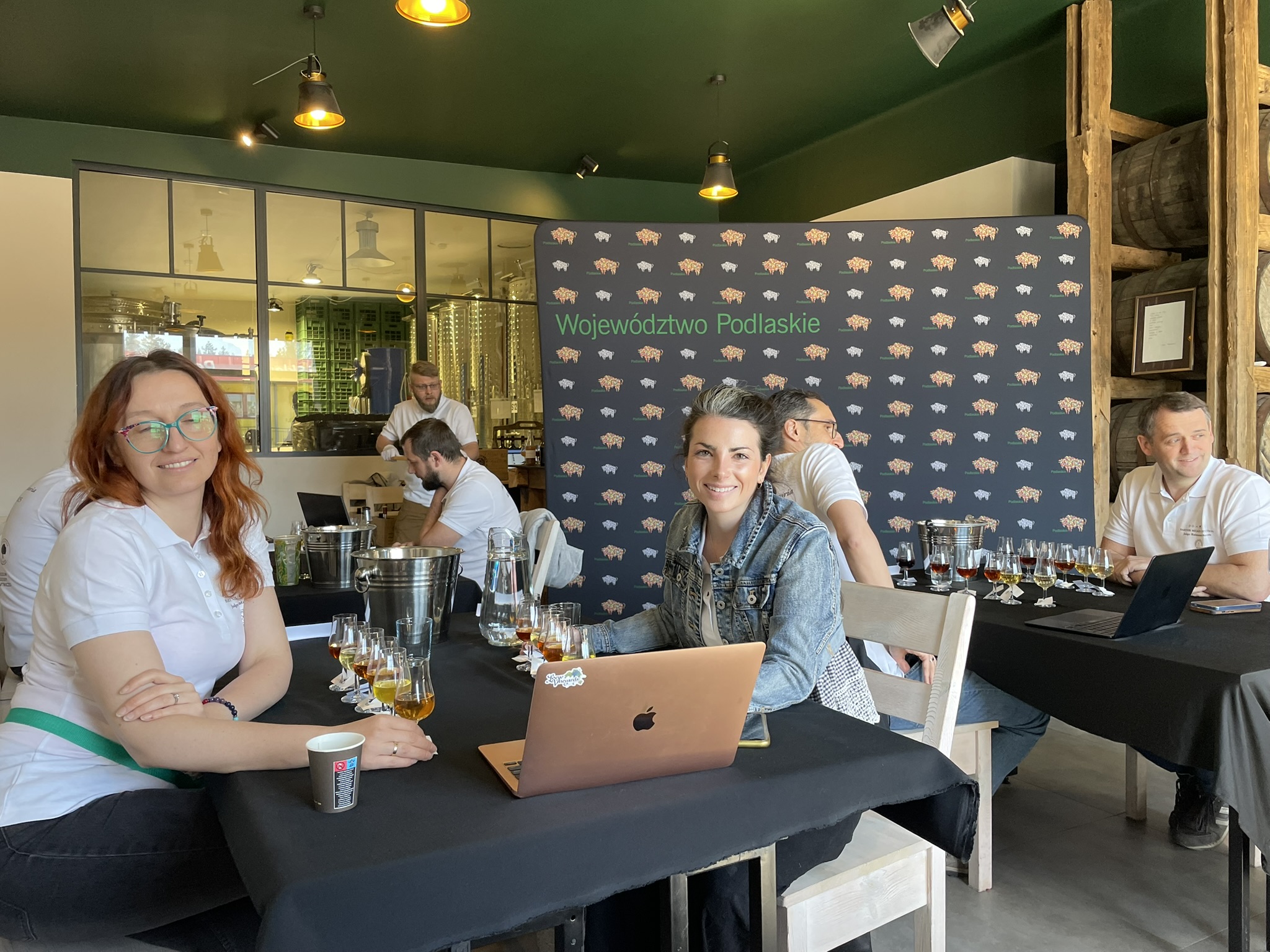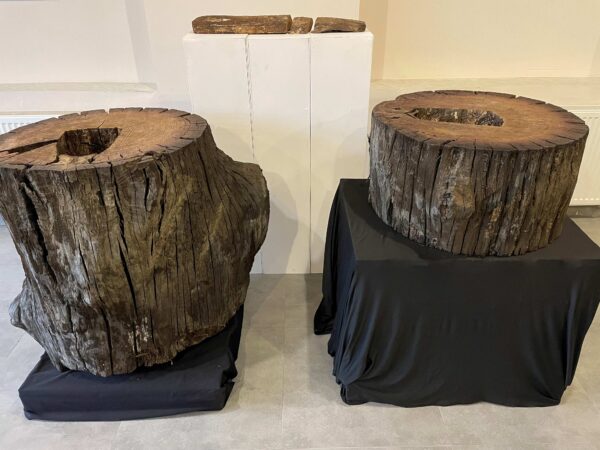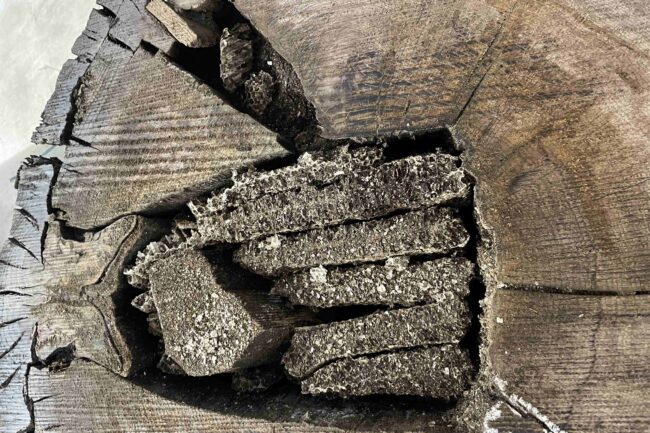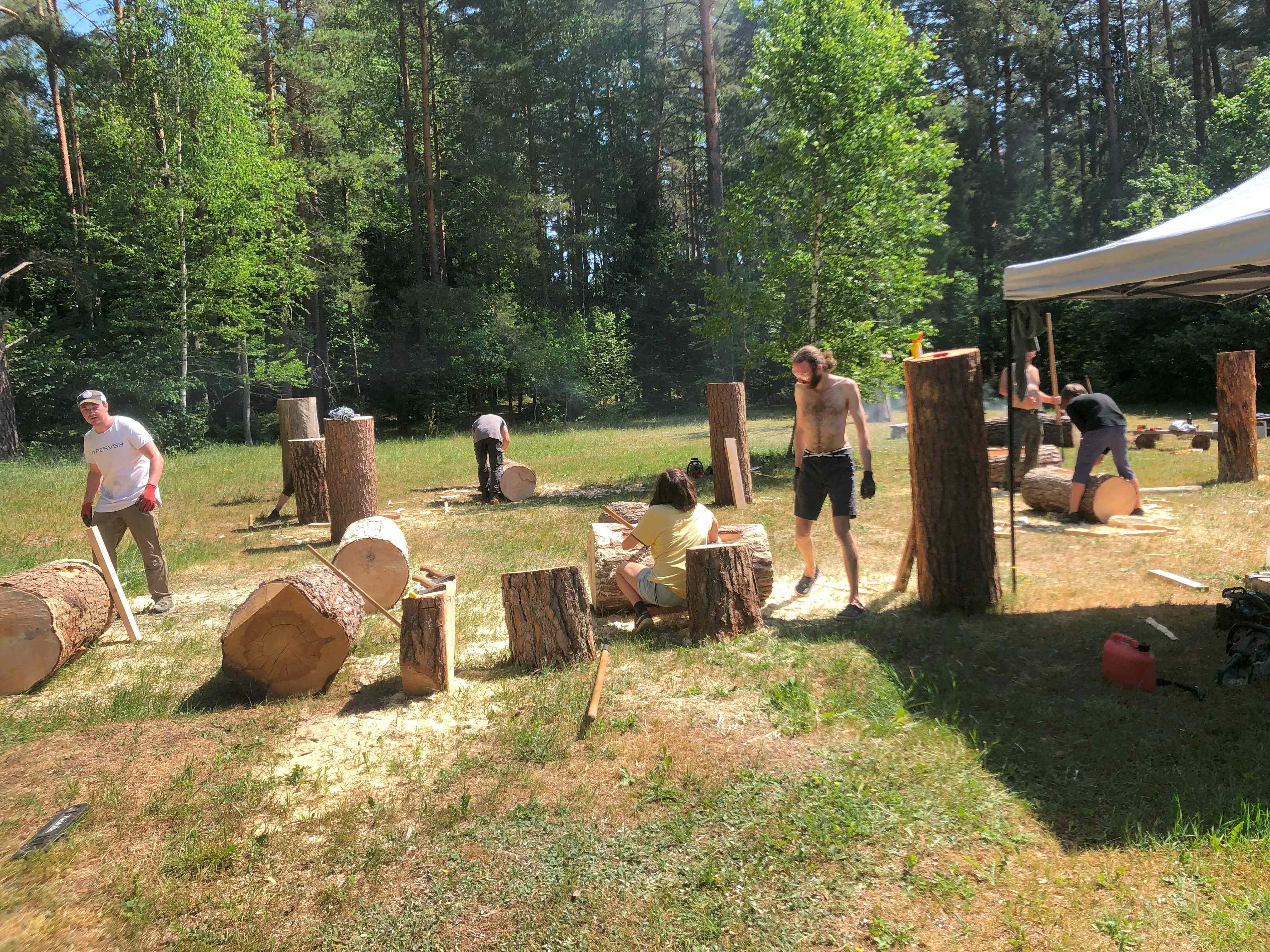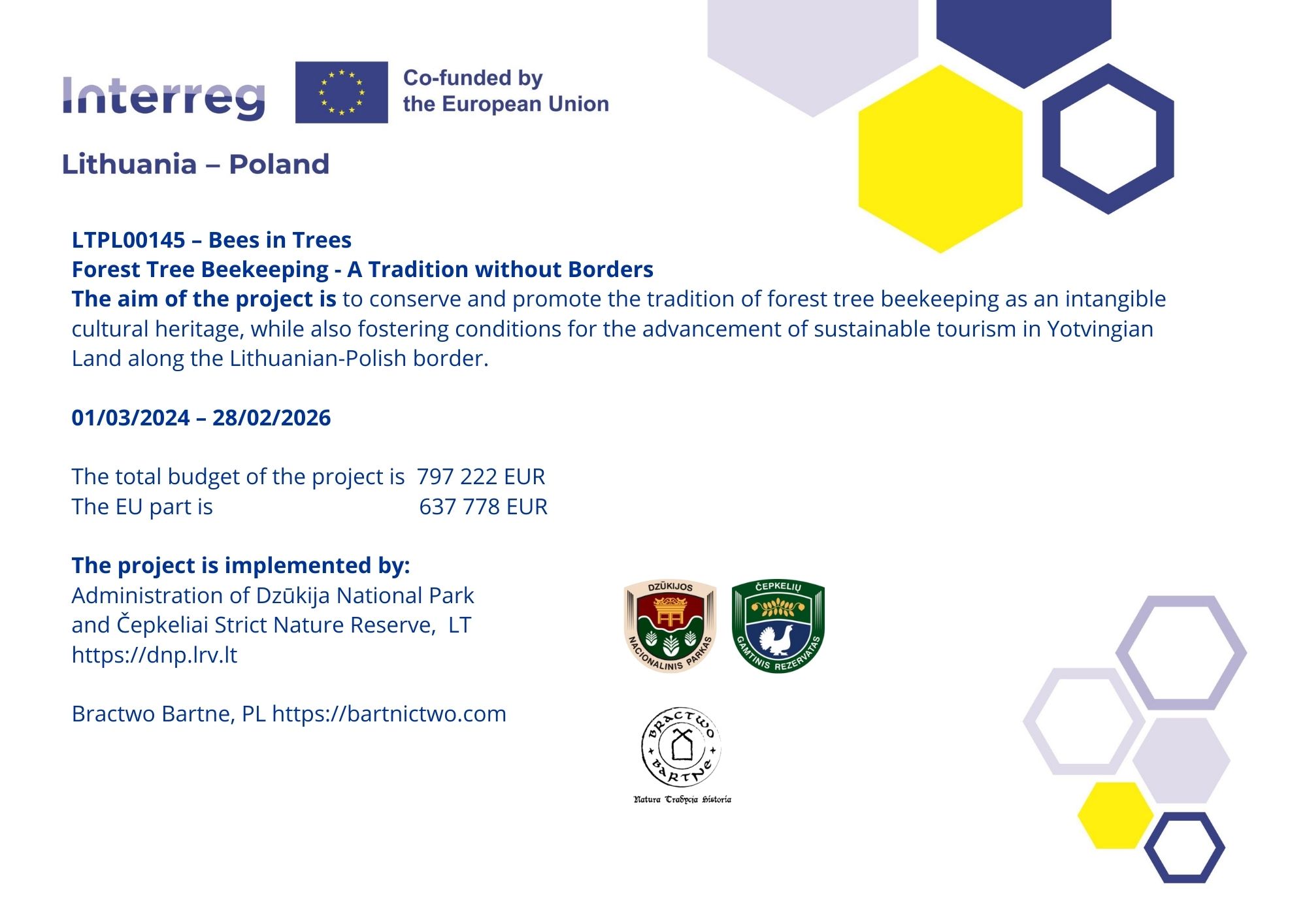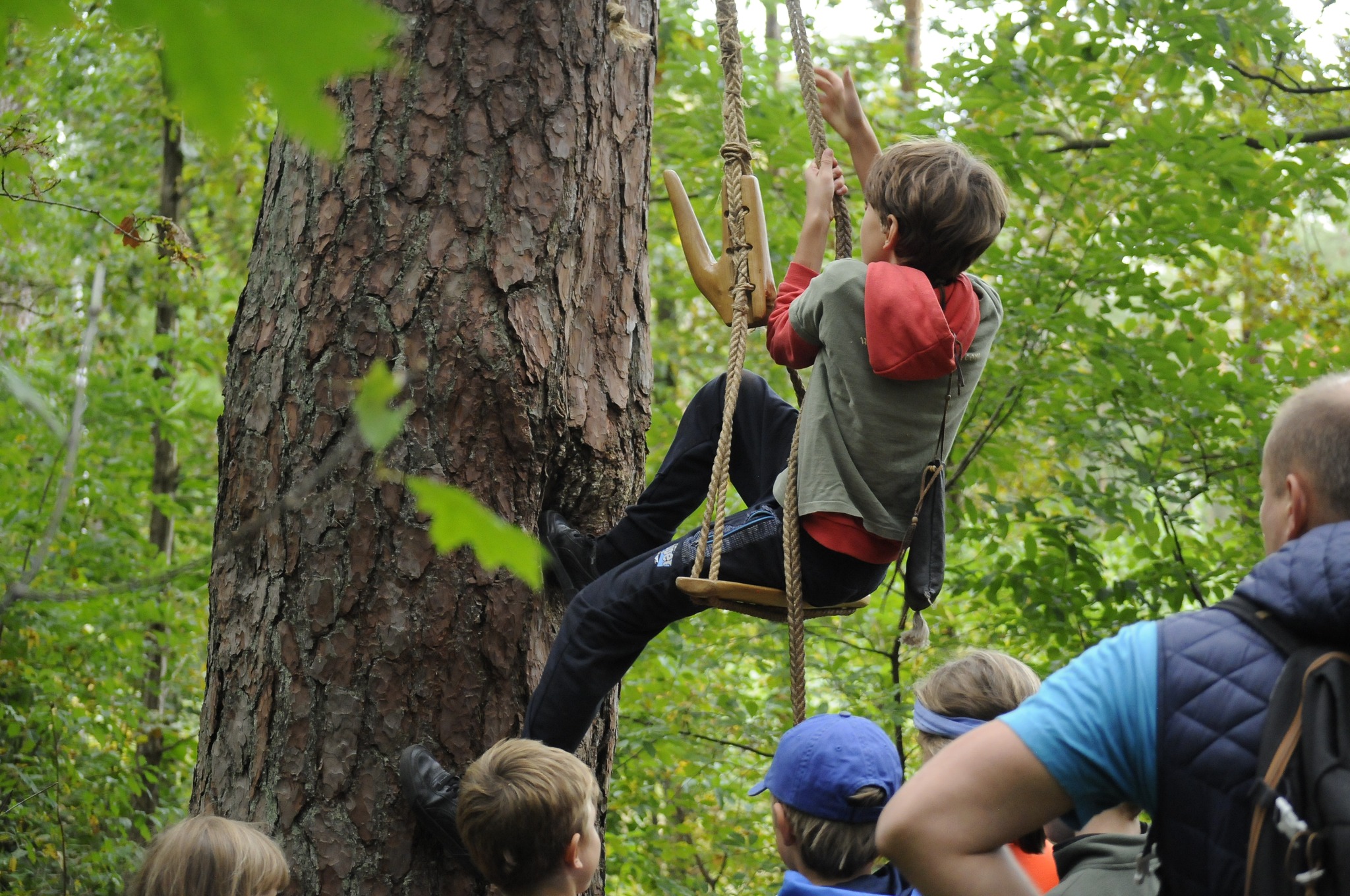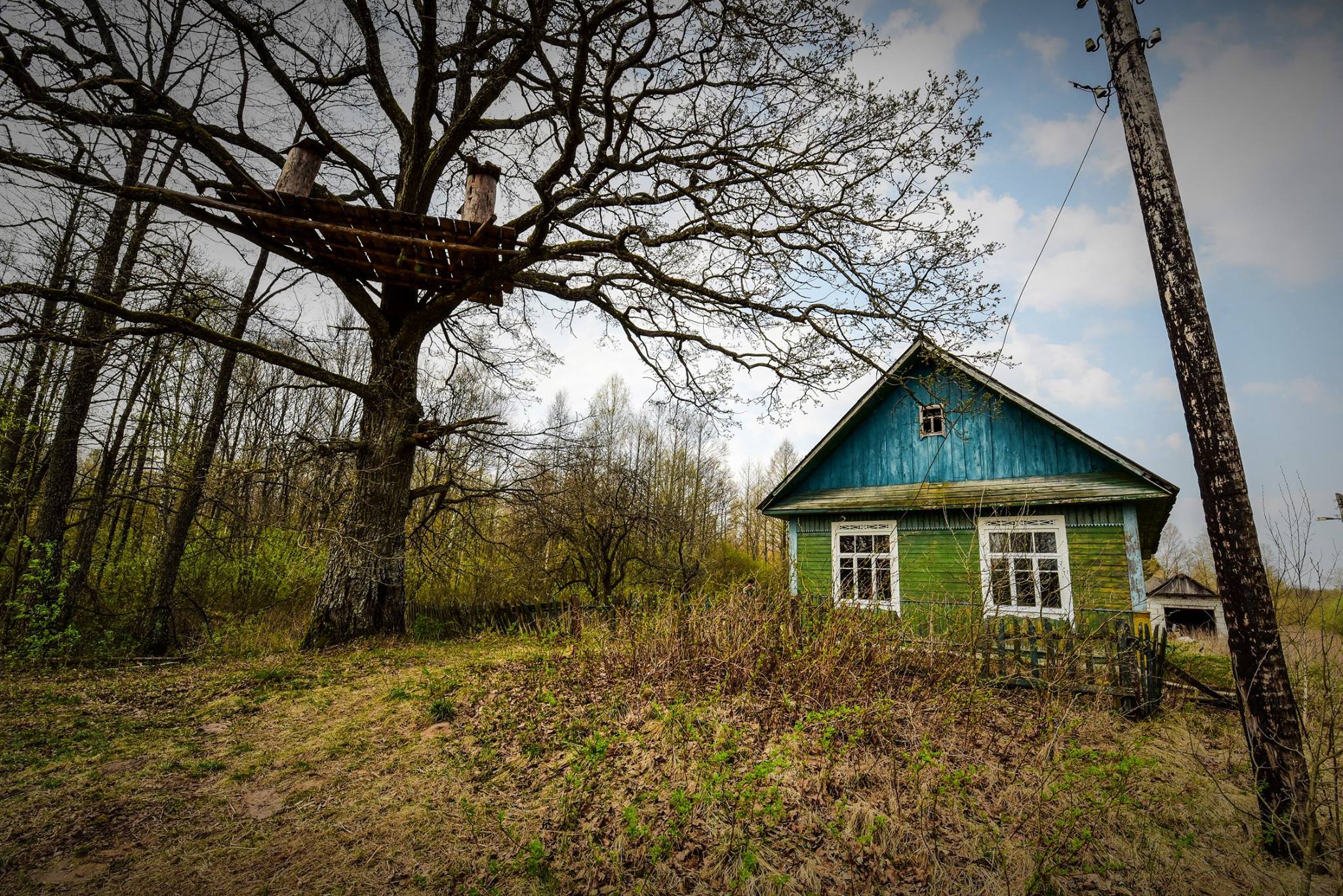Tree Beekeeping Brotherhood at APIMONDIA 2025
Between September 23rd and 27th, 2025, the capital of Denmark, Copenhagen, hosted APIMONDIA, the world’s largest and most prestigious international beekeeping conference. The event, held every two years in a different part of the world—previously hosted in countries such as Chile and Canada—brought together thousands of participants, experts, and enthusiasts from across the globe.
Mead Competition Bartnik 2025
1st and 2nd of May .2025, the International Mead Competition Bartnik took place in Augustów.
The competition was organized by Treebeekeeping Brotherhood together with Augustowska Miodosytnia and Miodosytnia pod Dębem. The strategic partner of the competition was the Podlaskie Voivodeship.
Where did the idea for the competition come from?
In ancient times, tree-beekeepers were the main suppliers of bee honey used to produce mead. The competition aims not only to promote mead making and show the wealth of flavors that can be obtained from bee honey, but also to present the common culinary heritage associated with this oldest alcoholic beverage known to mankind. 108 meads from Poland, Lithuania, Estonia, Spain, the Netherlands, Mexico, and even the USA and Australia were submitted to the competition. 99 of them reached us and all were assessed by experienced mead judges according to the standards and systematics of the Mead Judging Program.
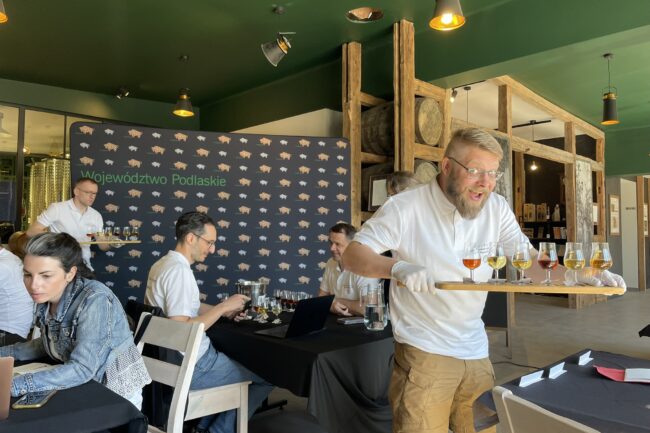
Bartnik Mead Competition
Oldest bee colony in the World
In the Museum of Beekeeping Culture run by our Brotherhood houses many interesting exhibits, but no one can remain indifferent to this one. It is a tree-hive from the 7th/6th century AD. While medieval beehives can be found in the collections of some open-air museums in Poland or in other countries, in our case the history is much more unique. And the tree itself had its last growth in 680 AD.
Tree-beekeeping Workshop in Poland: 11th Aprill to 13st Aprill 2025
INTERREG PL-LT Forest Tree Beekeeping – A Tradition without Borders LTPL00145 – Bees in Trees
Forest Tree Beekeeping – A Tradition without Borders
LTPL00145 – Bees in Trees
The aim of the project is to conserve and promote the tradition of forest tree beekeeping as an intangible cultural heritage, while also fostering conditions for the advancement of sustainable tourism in Yotvingian Land along the Lithuanian-Polish border. The primary guardians and champions of the forest tree beekeeping tradition are Bractwo Bartne in Poland and the Administration of Dzukija National Park and Cepkeliai Strict Nature Reserve in Lithuania. These two organizations will combine their efforts, human resources, and financial assets to preserve the living tree beekeeping tradition in Yotvingian Land and to promote this unique cultural and natural heritage for both tourism and community purposes. With the assistance of ERDF funding, the project aims to expand the Museum of Tree Beekeeping Culture in Augustow and enhance its exhibits, establish the Beekeeper Homestead in Musteika village, advance understanding of the tree beekeeping tradition, strengthen the capacities of partners, tree beekeepers, and local communities, popularize the tradition among target audiences, visitors, culture enthusiasts, and nature lovers, create conditions for sustainable tourism, and promote the heritage of Yotvingian land nationally and internationally. It is anticipated that through the development of a cross-border tourism route, improved tourism services, and promotional events, the project will contribute to heightened visibility and acknowledgment of the cross-border region. Furthermore, the project will serve as a catalyst for community engagement and enhanced opportunities for local development.
The project duration is 24 months, 01/03/2024 – 28/02/2026.
The total budget of the project is 797 222 EUR
The EU part is 637 778 EUR
The project is implemented by
Administration of Dzūkija National Park and Čepkeliai Strict Nature Reserve, Lithuania,
https://dnp.lrv.lt,
acting as a lead partner, and
Bractwo Bartne, Poland, https://bartnictwo.com,
acting as project partner.
This information was prepared using financial support from the European Union. The content of this information is the responsibility of the Bractwo Bartne. Under no
circumstances can it be considered to reflect the opinion of the European Union.
More information about the Interreg VI-A Lithuania-Poland 2021-2027 Cross-border Cooperation Programme can be found on the website
https://lietuva-polska.eu and on the
EU website www.europa.eu

Invitaition for Kleczba 2023 – Augustów, Poland 9.09.2023
We would like to announce data of this Year tree-beekeeping festival – Kleczba. Event would take place as every year in Augustów, Poland at place called Camp Zatoka . At this location workshop, evening concert and fire camp would take place and quest game would start and Finnish. Event is dedicated both for kid’s, families and adults and each of You would find interesting time there!
We as organisations do not help with accommodation. You can book Your night at Camp Zatoka, using Camping or they accommodation or rent something in nearby hotels. If You are willing to came to our festival this Year Please fill out this short formula.
https://docs.google.com/forms/d/1F3HbXALhaM30nBIyWe9Ij4yQKlgCIMfYpTUuok-J9HY
Plan for the day: 11:00 – start of the Quest game. Distance 6-8 km through forest with 5 task’s on the way.
14:00 – first workshop
16:00 – second workshop
18:00 – mead making workshop (with tasting of mead made on last Kleczba 2022)
20:00 – evening concert and fire
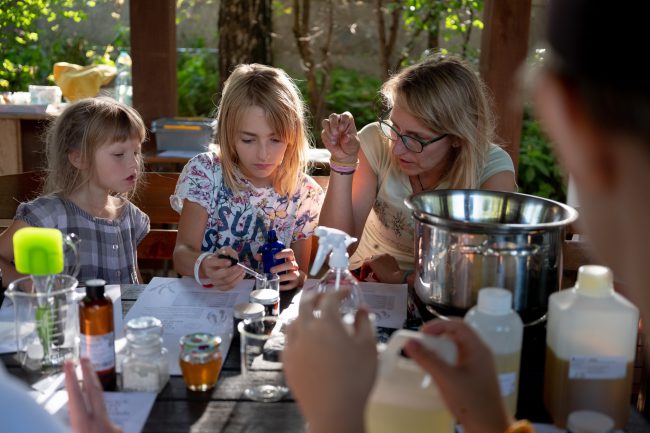
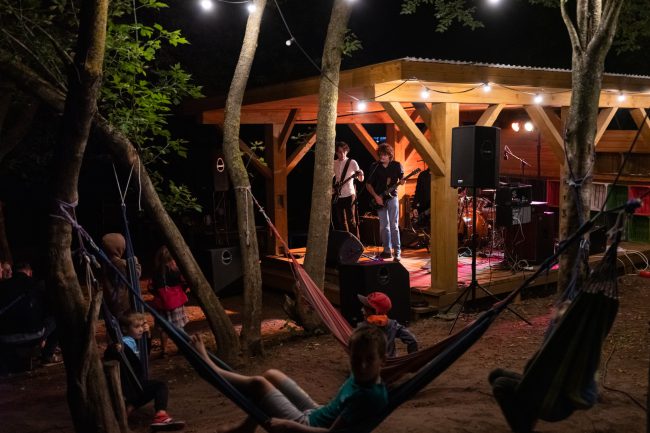
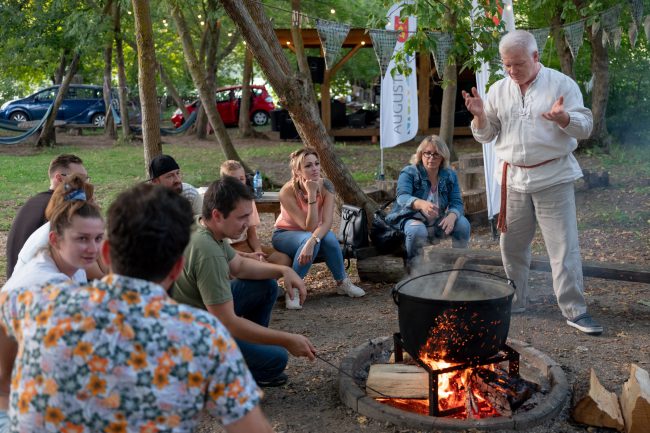
Help us create Museum of Tree-beekeeping Culture
From 6 month we work to create Museum of Treebeekeeping Culture in Augustów, now when our work is almost finished we need to ask You for the support.
Help us finish the exhibition and infrastructure of the museum. Museum is an joint venture of our Brotherhood, Non Profit Enterprise Bartnicy Sp. z o.o. supported financially by Augustów Meadery. We work hard to create the place wchih complecity show the idea of tree-beekeeping and explain all aspects connected with keeping bees in the trees. Will show what the tree-beekeeping culture is about, and how we work witch forest bees. Also will explain that tree-beekeeping is not an outdated practice but important part of our selfidentity and way to preserve biodiveristy and feral bees (dark bee – apis mellifera mellifera)
We create fundraising campaign on main Polish Founddrising page: https://zrzutka.pl/ms39nt
We invite You to support our project by zrzutka.pl;
Pay Pall ;
Or traditional wire transfer with title: donation – museum
IBAN PL 14 1090 2789 0000 0001 3097 4267
Bractwo Bartne
Frącki 8A, 16-506 Giby
KRS: 0000568323 | REGON: 362092361 | NIP: 8442355371
We thank You for any support!

Treebeekeeping culture at UNESCO list !
Tree-beekeeping is now part of world heritage culture – this final step is the result of more than 6 years of our cooperation and work for promotion and protection of this unique form of beekeeping and the heritage associated with this practice. This jurney start’s in 2014 and after inscription of the Treebeekeeping on Polish National Intangible Heritage List wchih we achives in 2016 and year later our friends from Brotherhood of barefooted tree-beekeepers gets in 2017 an formal work could be started. First draft of UNESCO application were prepered by Piotr Piłasiewicz from Bractwo Bartne and Ivan Osipau from Brotherhood of barefooted tree-beekeepers
– This is our common heritage, something that we can share together, which unites our nations and allows us to say – hey we are proud of it! I know that without bearers from Belarus we would not be motivated enough to sustain and develop the tree-beekeeping in Poland. – say Piotr Piłasiewicz founder of Treebeekeeping Brotherhood in Poland.
Tree-beekeeping was the most common kind of beekeeping for all areas of the former Polish-Lithuania Commonwealth until the 19th century. Despite the beekeeping technology evolving, this tradition was well preserved in rural areas of South-East Belarus and in some small communities in Podlasie district in Poland.
– The most important thing was to get the consent of the community of tree-beekeepers to be included in the list and hear from them their own position: whether tree-beekeeping should become an intangible cultural heritage and continue to be preserved. During two expeditions, we interviewed around about 50 families of tree-beekeepers and heard in one voice: „This is an important matter! Tree-beekeeping must continue to exist!” After such sincere words, it became clear to our team of specialists that we need to go further and work to make tree-beekeeping an intangible and cultural heritage of humanity. – say Ivan Osipau founder of “Brotherhood of barefooted tree-beekeepers; in Belarus
We all hope that this recognition is not a finishing point; it is the beginning of a new activity, continuation of old traditions and the preservation of the cultural fabric for future generations. This is a sustainable development of creative practices, crafts, knowledge in the community, and the transmission of tree-beekeeping culture into society and the future.
Belowe is an short interview with two peoples that stands behind the succesfull Polish Belarus application of treebeekeeping culture on UNESCO Representative List of the Intangible Cultural Heritage of Humanity
Ivan Osipau (I.O. ) is the chairman of NGO for development of traditional tree-beekeeping, Brotherhood of barefooted tree-beekeepers", the initiator, member of the working
group, tree-beekeeping.
Piotr Piłasiewicz (P.P.), Augustów, Poland – founder and chairman of “Treebeekeeping Brotherhood” – first NGO for development of traditional tree-beekeeping, co-author of Polish application and initiator of Polish-Belarus international application.
– When did it start?
I.O. It started a long time ago, in 2014, when the first small but very significant investigation into the land of tree-beekeeping, in Lelchytsy district of Modern Belarus. Of course, the investigation was not conducted independently, but under the leadership of the famous ICH expert Regina Gamzovich. We planned to get acquainted with the bearers of the traditions and find out for ourselves and the public: is there tree-beekeeping in modern Belarus? It turned out there is, and it has existed for a long time, as there are whole dynasties of tree-beekeepers who continue the tradition of their grandfathers. For us, it was inspiring. We were happy to meet new people and find a treasure of intangible culture. Then the idea arose: we must do everything to get tree-beekeeping on the list of ICH of Belarus.
P.P. Our journey with tree-beekeeping started in 2013 after visiting the Belarus region of Polesie. We spoke to local tree-beekeepers and also found 2 families of tree-beekeepers in Augustow Forest – my home region in Poland. I realize very fast that something that survives in Poland would only be a shadow of the past; a memory often reflected in local communities folklore. This was an understanding of nature that was preserved very well among swamps and forests of southern Belarus, and is still seen as a profession and way of living. At that time you couldn’t find anyone in Poland that could say: “I run 50 log hives by my own, and this is my profession and way of living”. I realized from the beginning that only together with Belaussians can we keep this intangible heritage alive.
– Why include the ICH of Belarus and Poland in the list?
I.O. If the formal side is covered – it is a requirement of the organization to include the element in the UNESCO ICH list in ongoing work. But if we talk about real life, then in Belarus such a list, and the elements in it, is a procedure for rethinking and obtaining an important status. This is not so much for experts, but for the community itself. It was the same with tree-beekeeping in Belarus. It took a lot of work to add an element to the National
ICH List: talk to tree-beekeepers, record more than 20 hours of video interviews, more than 3,000 photos and more than 20 hours of audio. But the most important thing was to get the consent of the community of tree-beekeepers to be included in the list and hear from them their own position: whether tree-beekeeping should become an intangible cultural heritage and continue to be preserved. During two expeditions, we went around about 50 families of tree-beekeeping and heard in one voice: "This is an important matter! Tree-beekeeping must continue to exist! '' After such sincere words, it became clear to our team of specialists that we need to go further and work to make tree-beekeeping an intangible and cultural heritage of humanity.
P.P. Including tree-beekeeping on the National Intangible Heritage List in Poland was much easier than in Belarus. In 2016 there were just a few individuals in Poland that could name themselves tradition bearers from generations. There were a few in Augustow Forest and some in the Bialowieża and Kurpie regions. Although Tree-beekeeping was still part of local folklore, reflected in local festivals and traditions rooted in tree-beekeeping. However there was also an increasing number of new adoptions of this tradition – it became more and more popular. Starting from 2014 in Augustow we have Barciowisko – a log hive making competition. This is a very important part of promotion, which spreads the knowledge and tradition. The woks of prof. Krzysztof Heyke co author of NCC application in Poland who documented and photographed tree-beekeepers across Poland, Belarus and Ukraine showed how much we have in common. Tools, language, way of understanding nature and bees. We found that traditions and practice are very similar despite the fact the communities have lived isolated
from each other.
– How was the UNESCO nomination case made?
I.O. I want to say at once that it was a common cause that allowed us to show the culture of tree-beekeeping more thoroughly and to some extent more broadly and to go beyond our own perception. The most responsible was determining the name of the element. The name itself was agreed at the very end of the nomination preparation, although the original name was retained at all times. Over a two year period, three major common meetings were held in Minsk, Hrodna, and Warsaw. These have become activities of exchange, brainstorming and creative realization, debate and the search for what is now inscribed as a tree-beekeeping culture. Also this work was conducted online, when there were more than 300 dialogues and many emails. Next was the challenge of making a common film. And it was really difficult – because you need to take into account all aspects, the depth of cultural context, and to show the culture of tree-beekeeping within the communities of Belarus and Poland.
P.P. When we got the inscription on the national list we were asked by Polish UNESCO Committee: “Are You interested in applying for World Intangible Cultural Heritage status?”
Our answer was fast but we give one condition: Yes, only if this work would be held as an international Polish-Belarus application. This got the positive opinion of Polish UNESCO Committee and first preparations were started in 2017 even before Belarus was included on the National list which is a formal condition for UNESCO application – but we want to be ready as soon as we can. Then the first meeting was arranged in Warsaw and the official
work started. First draft versions of the application were written by Ivan and myself, then as more and more people were involved in the process it was easier to fill it with content, but at the same time harder to find a common approach. In the end I think we found a common position that satisfied all.
– What is the most difficult part of this?
I.O. The most difficult thing is to take responsibility for the community of tree-beekeepers, because we had to look for answers to many questions based not on personal feelings, but from the point of view of the whole community.
P.P. Most difficult from my perspective was something which should be obvious: it was to combine all the local elements in one coherent picture of tree-beekeeper culture. To gather all those aspects and show the things that are common for all bearers.
– How important is the status of an item on the UNESCO ICH Representative List
for your community?
I.O. It is probably not possible to assess the importance – but really this status provides new opportunities for the transmission of the culture of tree-beekeeping in the future, and increases the status of this creative activity in the community, which is very important for the community and the environment at local, national level and abroad.
P.P. This is an important matter for the local communities and for our Brotherhood that associate the tree-beekeepers mostly from Poland but also from Belarus. We organize workshops together, promoting tree-beekeeping as our common tradition. It’s also an important matter for sustainable use of forest both in Poland and Belarus. It is a great honor for us and motivation for further action. It confirmed that we are acting for a good reason. It also shows the cultural and natural value of the Forest and I hope soon tree-beekeeping would be used more as a matter of nature conservation for protecting forest area’s from intensive logging which we face in Poland.
– What’s next?
I.O. Next – more. The current status is not a finish-point, it is the beginning of a new activity and a continuation of old traditions and the preservation of the cultural context for future generations.This is the sustainable development of creative practices, crafts, knowledge in the community, the transmission of tree-beekeeping culture in society and further into the future.
P.P. We would like to continue what we started. I hope Ukrainians will also apply for joining the inscription in the next few years. Tree-beekeeping is becoming a place for dialogue and understanding between our Nations. This is what we would like to keep developing. I also hope this inscription will help to stop depopulation processes in rural areas of Belarus tree- beekeeping could be a source of income and tourist attraction factor there – but of course only when the situation in this country is more stable.
I.O. it is the work and participation of a large community of diverse people: from the bearers themselves, thanks to them and their families, this heritage has been preserved – to experts, practitioners and stakeholders on the topic. Personally, I would like to thank the tree-beekeepers and their families; my family who supports me; friends and acquaintances who have emerged recently when tree-beekeeping has become more than a topic; to all those who have been with me, or on their own, have been part of this craft in recent years. Without your participation and help, not everything would have worked out. We and all of you have already
become part of the tree-beekeeping culture community.
P.P. Tree-beekeeping is always team work, You never climb on a tree with the bees alone, always someone looks after you from the ground. The inscription could be done only because of the participation of a diverse peoples and communities. bearers, passionate, ethnography and nature conservators. And because of the back up we had from each other. But what most important: we did it together putting aside our national aspirations and focus on the tradition and it’s continuity.
7th Tree-beekeeping Workshop in Belarus: 16th to 19nd of Aprill 2020
We invite You for a great adventure! Our workshop would be held for the 7th time in remote area of Naliboki Forest – biggest forest complex in Belarus, located only 90 km West from Minsk. Seams to be far away? No, it’s just 100 from Minsk International Airport. And what’s more important if You arriving to Belarus by air You do not need visa to entry!
Participant working in pairs using a chainsaw and traditional tools will make an loge hive. The work will be carried out under the supervision of two experienced tree bee-keepers. From Poland and Belarus, both English speaking. The program of the workshop include not only discovering the tree-beekeeping tradition specific for Central and East Europe and gaining skills in log making, learning practical knowledge of hanging them on the trees, attract and keeping the bees in this kind of hives. Also we’d like to show You this beautiful place and wild nature of Nalibki Forest, the biggest forest complex in Belarus. Workshop would be held in the most remote place in this forest on the small island surrounded by swamps and forest, 20 km from closes village and 8 km from closest neighbor. Accommodation conditions are very simple: a house with only 2 big rooms, kitchen and sauna for batch and relax after hard day of work. Only local cushion would be served prepared by local cook at place. We spend there together 3 days, working, learning and exploring the beautiful wild nature of Naliboki Forest. Sleeping bags are essential. We would stay in the place which we renovate in 2018 by ourselves using small donation we use on our crowd-funding project.
Her’s some short invitation clip we did on previous workshop:


